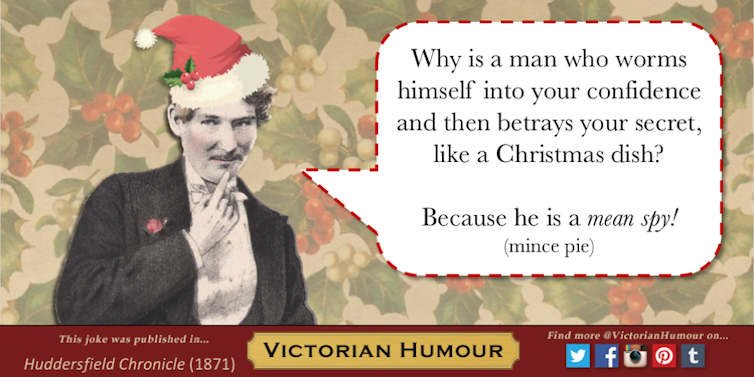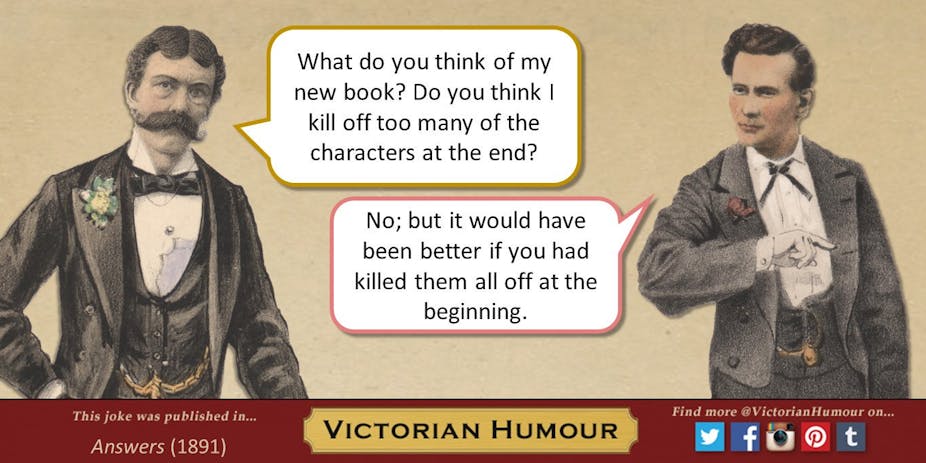Why is a Christmas pudding like the Atlantic Ocean?
Because it is full of currants.
Have you heard that one before? It’s the kind of groan-worthy pun that often gets an airing at this time of year. Millions of people in Britain will pull a cracker on Christmas Day, don the paper crown within, and inflict an old joke like this on their families. For my long-suffering household this experience will be all too familiar – they put up with it all year around, as I research the history of Victorian jokes.
This might seem like a rather unpromising topic. After all, we’re accustomed to thinking of the Victorians as a rather humourless bunch – a straitlaced society in the fashion of their queen, who was famously “not amused”. But this old stereotype isn’t really fair. Millions of jokes were written and told during the 19th century. They were printed in books and newspapers, performed in theatres and music halls and retold in pubs, kitchens and Hansom cabs throughout the land. I found the Atlantic currants joke above in a copy of the Lancaster Gazette from 1871.
Thousands of other Victorian jokes, puns, comic anecdotes and character sketches have been preserved within the British Library’s archives of historical books and newspapers. For the past two years, I’ve been digging up these long-forgotten gags and bringing them back to life, building a digital archive of historical humour that will eventually contain millions of old jokes from a range of historical periods. Work is still underway, but you can find hundreds of examples at @VictorianHumour on Twitter and Facebook.
It turns out the Victorians joked about much the same topics as we do: cutthroat lawyers, quack doctors, mothers-in-law, foreigners (particularly the French), celebrities, political news, romantic misadventures, family squabbles, fashion faux pas, cheeky children, and other amusing situations drawn from everyday life. For a historian like me, these gags offer valuable insights into the inner workings of Victorian society. Laughter, after all, is a powerful thing – as anybody who’s ever been the butt of a cruel joke can attest.
Lots of Victorian jokes were made at the expense of women. Wives, for instance, were routinely depicted as spendthrift chatterboxes who were obsessed with buying new hats and making their husbands’ lives a misery.
This casual misogyny fits our expectations of the 19th century as a period in which women’s freedoms and voices were more constrained. But other jokes tell a different story. I’ve found countless examples in which women get the upper-hand over idiotic husbands, wittily reject the advances of bumbling suitors, and crack jokes among themselves.
Indeed, while joking was generally depicted as a masculine activity during this period – including even a “your mum” joke – an analysis of entries submitted to a popular newspaper’s joke competition reveals that about 20% of the gags were written by women. Victorian ladies, in other words, weren’t just passive victims of humour, but active wielders of wit.
None of the jokes have quite “gone viral” yet with modern audiences. But some were popular enough to have travelled all over the world during their day. Just as with social media today, joke piracy was rampant in the 19th century. While some newspapers employed professional joke writers, most just stole their gags from other publications. This allowed snippets of humour to be passed from city to city and eventually from country to country.
For example, in 1890 a joke started to circulate in America about an undertaker who placed a sign outside his shop that read: “You Kick the Bucket; We Do The Rest”. The gag bounced around the American press for a few months, before it was spotted and reprinted by the editors of a London paper who were always on the look-out for interesting tit-bits from across the pond. The joke circulated throughout Britain until, in 1893, it eventually ended up as the finale of an after-dinner speech made by a Conservative politician in North Wales.
Indeed, imported “Yankee Humour” was remarkably popular with Victorian audiences. British newspaper editors routinely clipped jokes from American newspapers and, in many cases, gathered them into regular weekly columns. By the 1880s, some newspapers even phased out British jokes in favour of “fresh” and “racy” wit from the other side of the Atlantic. “The best [English humourists] are silent now,” observed one Victorian critic:
We are almost compelled, therefore, to go to Yankee writers for the great bulk of our fun. But we go very willingly. And we go, mainly, because we find in the work of our lively cousins so much that is agreeably fresh and individual. It is, we say to ourselves, so unlike anything that we can get from our own people; it is so characteristic. It is like roaming about in a new world of quip and quiddity.
Long before the arrival of Hollywood cinema, here was an American form of popular culture taking Britain by storm.
Above all else, however, the Victorians and their Georgian predecessors loved puns. The Punster’s Pocket-book (1826) contained essays on the art and the origins of punning, along with choice bits of wordplay from great historical wits. Entire books of puns were also published, including Puniana (1867) and More Puniana (1875), which contained hundreds of pages of exquisitely tortured wordplay. Consider this appropriately festive example:
If you were to kill a conversational goose, what vegetable would she allude to?
Ah-spare-a-goose! (asparagus)
Or this bizarre bit of wit:
When do we possess a vegetable time-piece?
When we get-a-potato-clock (get up at 8 o'clock).
So, as you pull your Christmas crackers – themselves a Victorian invention, dating from the 1840s – and prepare to groan at the pun inside, consider that at least those gags don’t require a historian to explain why they’re supposed to be funny.
If you’re feeling brave enough to inflict some Victorian jokes on friends and family this Christmas (it’s a great way to drive relatives out of your house when they’ve overstayed their welcome), you could start with these “cracking” festival examples.



